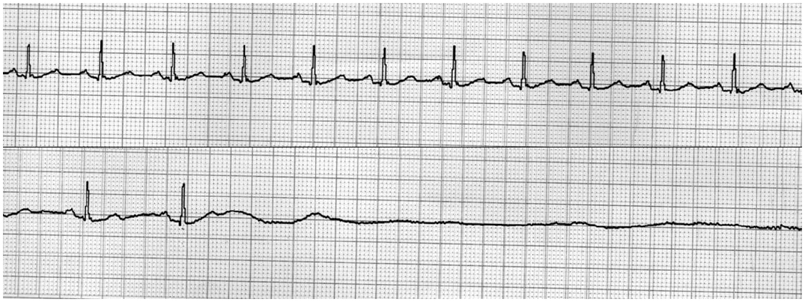Korean Circ J.
2008 Oct;38(10):561-563. 10.4070/kcj.2008.38.10.561.
Carotid Sinus Syncope in an Elderly Patient With Unexplained Syncope
- Affiliations
-
- 1Division of Cardiology, Department of Internal Medicine, Cardiac and Vascular Center, Seoul Veterans Hospital, Seoul, Korea. drjipark@naver.com
- KMID: 2225722
- DOI: http://doi.org/10.4070/kcj.2008.38.10.561
Abstract
- Carotid sinus syndrome is the most commonly reported cause of falls and syncope in elderly adults. However, it has been rarely reported in Koreans, and the reason of this ethnic difference is unknown. We report here on an Korean unusual case of carotid sinus syncope and this was induced by carotid sinus massage.
Keyword
Figure
Reference
-
1. Maggi R, Menozzi C, Brignole M, et al. Cardioinhibitory carotid sinus hypersensitivity predicts an asystolic mechanism of spontaneous neurally mediated syncope. Europace. 2007. 9:563–567.2. Polvikoski T, Kalaria RN, Perry R, Miller V, Kenny RA. Carotid sinus hypersensitivity associated with focal alpha-synucleinopathy of the autonomic nervous system. J Neurol Neurosurg Psychiatry. 2006. 77:1064–1066.3. Miller VM, Kenny RA, Slade JY, Oakley AE, Kalaria RN. Medullary autonomic pathology in carotid sinus hypersensitivity. Neuropathol Appl Neurobiol. 2008. 34:403–411.4. Masson C. Carotid sinus hypersensitivity: an age-related phenomenon. J Neurol Neurosurg Psychiatry. 2006. 77:1207.5. Kerr SR, Pearce MS, Brayne C, Davis RJ, Kenny RA. Carotid sinus hypersensitivity in asymptomatic older persons: implications for diagnosis of syncope and falls. Arch Intern Med. 2006. 166:515–520.6. Parry SW, Richardon DA, O'Shea D, Sen B, Kenny RA. Diagnosis of carotid sinus hypersensitivity in older adults: carotid sinus massage in the upright position is essential. Heart. 2000. 83:22–23.7. O'Mahony D. Carotid sinus hypersensitivity in old age: clinical syndrome or physical sign? Age Ageing. 2001. 30:273–274.8. Kenny RA, Richardson DA. Carotid sinus syndrome and falls in older adults. Am J Geriatr Cardiol. 2001. 10:97–99.9. Humm AM, Mathias CJ. Unexplained syncope: is screening for carotid sinus hypersensitivity indicated in all patients aged >40 years? J Neurol Neurosurg Psychiatry. 2006. 77:1267–1270.10. Mathias CJ, Deguchi K, Schatz I. Observations on recurrent syncope and presyncope in 641 patients. Lancet. 2001. 357:348–353.11. Alboni P, Brignole M, Menozzi C, et al. Diagnostic value of history in patients with syncope with or without heart disease. J Am Coll Cardiol. 2001. 37:1921–1928.12. Kim PH, Ahn SJ, Kim JS. Freguency of arrhythmic events during head-up tilt testing in patients with suspected neurocardiogenic syncope or presyncope. Am J Cardiol. 2004. 94:1491–1495.13. Park EM, Kim NH, Shim HO, et al. A case of recurrent carotid sinus syncope in patient with hypopharyngeal cancer with neck node metastasis. Korean J Med. 2006. 70:Suppl. 324–327.14. Coplan NL. Carotid sinus hypersensitivity and syncope: cause/ effect or true/true/unrelated. Arch Intern Med. 2006. 166:491–492.15. Richardson DA, Bexton R, Shaw FE, Steen N, Bond J, Kenny RA. How reproducible is the cardioinhibitory response to carotid sinus massage in fallers? Europace. 2002. 4:361–364.16. Kapoor WN. Syncope. N Engl J Med. 2000. 343:1856–1862.17. Healey J, Connolly SJ, Morillo CA. The management of patients with carotid sinus syndrome: is pacing the answer. Clin Auton Res. 2004. 14:Suppl 1. 80–86.18. Connolly SJ, Sheldon R, Thorpe KE, et al. Pacemaker therapy for prevention of syncope in patients with recurrent severe vasovagal syncope: a randomized trial. JAMA. 2003. 289:2224–2229.19. Shim WH, Oh KJ, Park SJ, Lee DK. A case of carotid sinus hypersensitivity syndrome treated with DDD pacemaker. Korean J Med. 1987. 32:242–245.
- Full Text Links
- Actions
-
Cited
- CITED
-
- Close
- Share
- Similar articles
-
- A case of carotid sinus syncope due to maxillary neoplasm combined with vasovagal syncope
- Cough-Induced Syncope in a Patient with Bronchial Asthma
- A case of swallow syncope with sinus pause and vasovagal syncope
- A Case of Paroxysmal Atrioventricular Block Complicating Takayasu's Arteritis
- Permanent cardiac pacemaker therapy in a patient with swallow syncope


